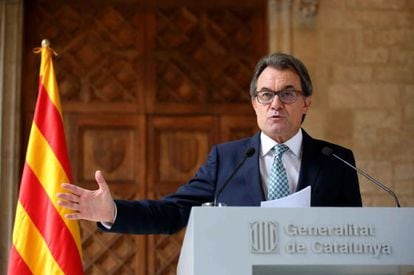Catalan leader replaces referendum with plan for an unofficial vote
Mas’s pro-independence allies unhappy with idea of a survey without legal implications

Catalan regional premier Artur Mas has announced that the planned November 9 referendum on self-rule for the region will not be held and will instead be replaced by an unofficial vote on the matter.
At a press conference on Tuesday morning, the leader of the CiU nationalist bloc admitted that cracks had begun to appear in the consensus between the pro-sovereignty parties. He also put on the table the possibility of calling plebiscite elections to confirm the result of the unofficial vote.
In Mas’s view, the referendum project – which has been temporarily suspended by the Constitutional Court while it examines a challenge lodged by Spain’s ruling Popular Party (PP), which is fiercely opposed to independence for the northeastern region – lacked sufficient legal guarantees to be significant. He called the Spanish state a “real and powerful adversary, because it is denying us the possibility of voting and of being consulted as a nation.”
The alternative he is proposing, which will take place the same day as the original vote, has all the trappings of a referendum, ballot boxes included, but will be more of a survey without any legal implications.
There will be no official census of voters, but there will be a voluntary registration process, Mas explained.
“We are ready to conduct the consultation on November 9: we will have polling stations open, there will be ballots and ballot boxes, and everyone over the age of 16 will be allowed to vote,” he said.
The question on the voting papers will be the same as planned for the original referendum: "Do you want Catalonia to be a state, yes or no?" If the answer is yes, the next question is: “Do you want that state to be independent?”
Such a vote, which the Catalan government publicly rejected less than a week ago, is a long way from the original referendum and its legal guarantees.
While not legally binding, the planned November 9 vote was backed by legislation that had been passed by the Catalan government, and had been officially convened via a decree signed by Mas. That legislation and the planned vote has been suspended pending the outcome of the appeal at the Constitutional Court.
The more fervently pro-independence Catalan Republican Left (ERC), the ICV leftist greens and Candidatura d’Unitat Popular (CUP) that had until now followed Mas’s route map have all to a greater or lesser extent distanced themselves from the new plan. In a tense meeting on Monday night, they refused to back his decision to scrap the original vote, though Mas said he trusted the rift between them could be repaired.
The move places all the pressure on the ERC, whose support Mas counts on to lead the Catalan parliament in a minority government. Until now the CiU leader had said that calling elections was not his priority, but today he indicated that plebiscite elections would be the final step in the process. “This will not be the definitive consultation. It will be the one before the definitive one,” he said in reference to elections.
The pressure falls on the ERC in two ways. First, because Mas has stated that he expects the party to call its supporters out to take part in the alternative vote, and second, because he said he hoped to partner with the ERC at the next elections. “In my personal opinion, there has to be a list with a united electoral program that obtains an absolute majority.”
On September 30, Spain’s Constitutional Court accepted an appeal filed by the ruling Popular Party (PP) against the Catalan referendum, which it considers illegal because it deprives all Spaniards of the right to vote on an issue of national relevance.
That same day, the court suspended all referendum-related activities until it rules on the matter.










































